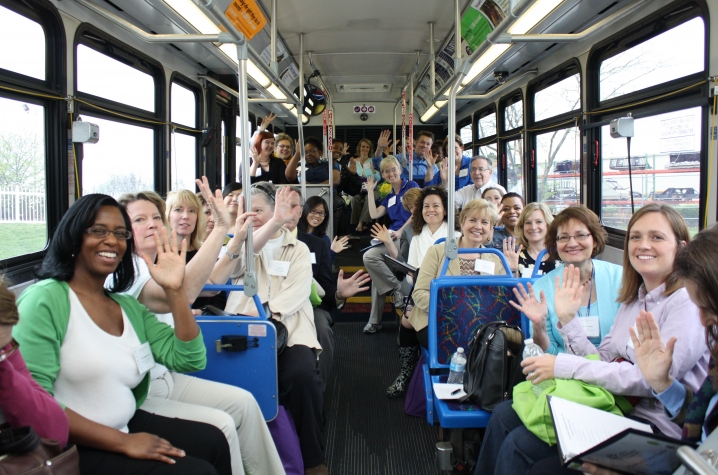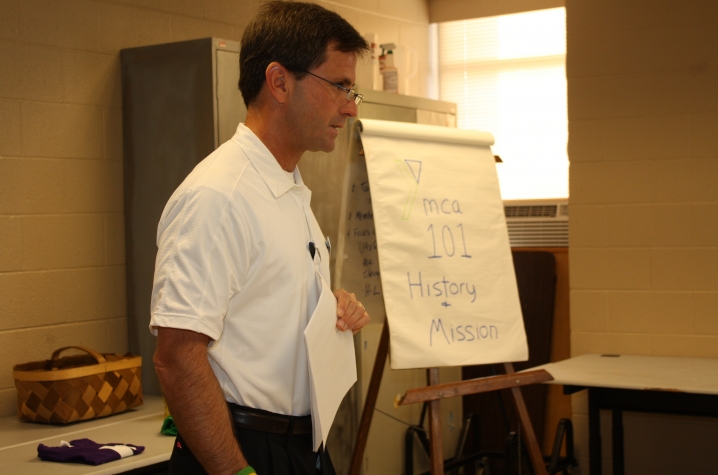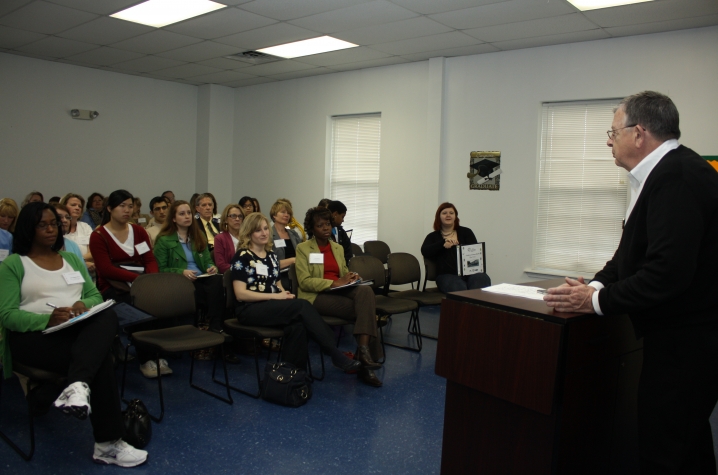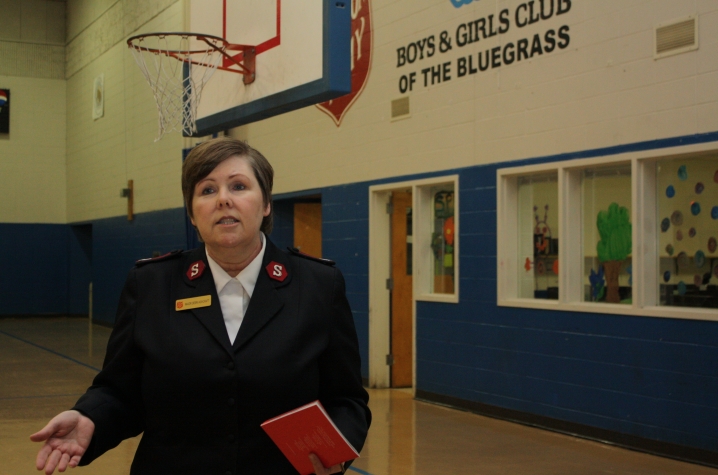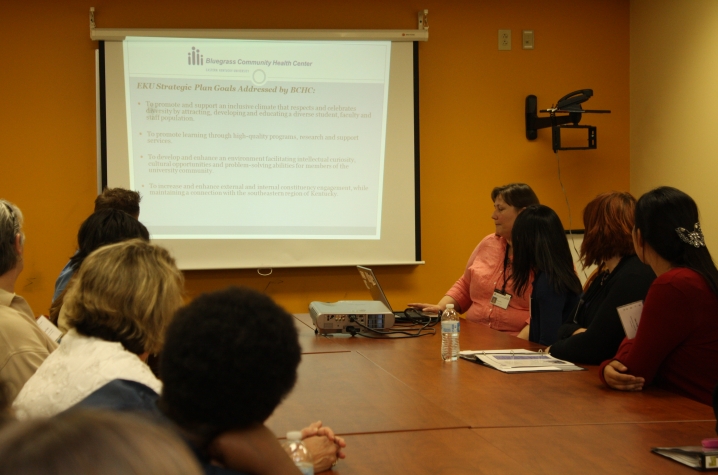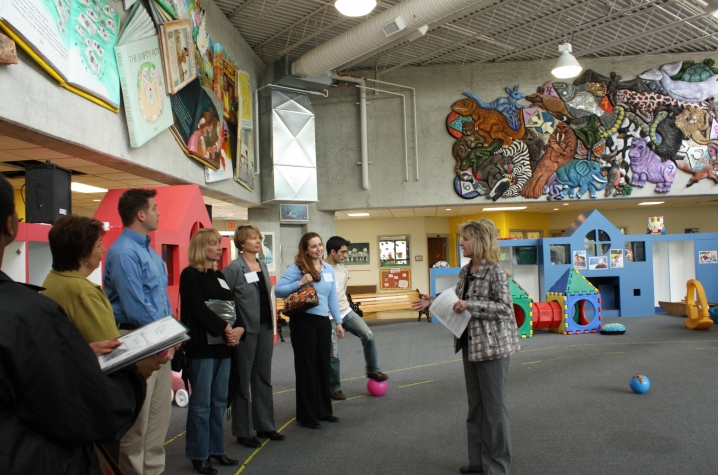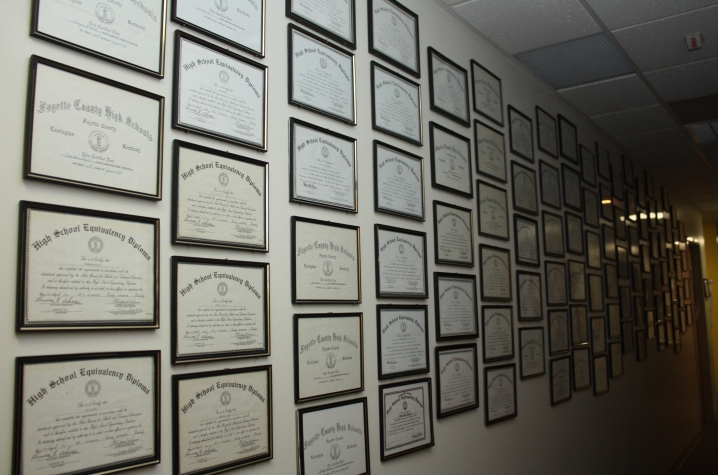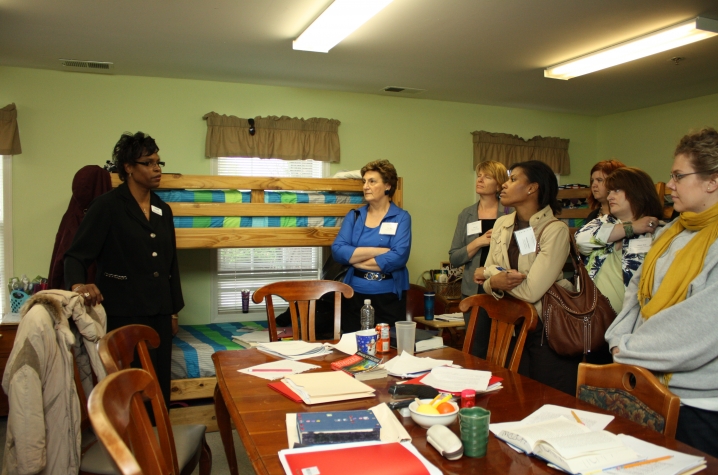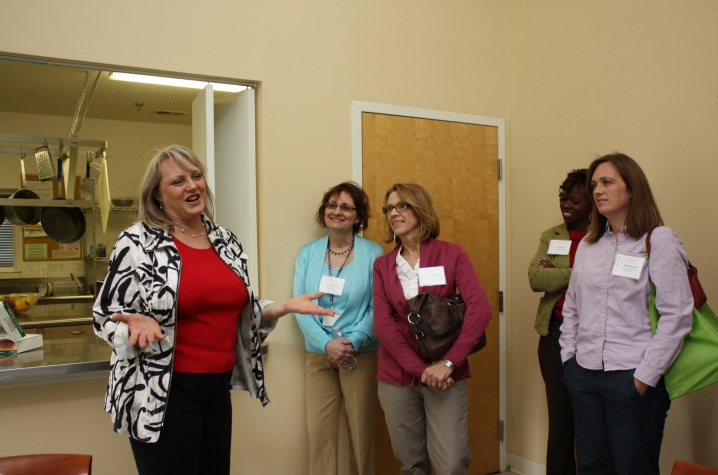Community Engagement Hits the Road
LEXINGTON, Ky. (Aug. 4, 2011) − Laura Hatfield knows all about the barriers to community engagement. Many people have no idea how to begin helping nonprofit groups do the important work they do. Plenty of University of Kentucky faculty, staff and students would love to help if only they knew how. That’s why Hatfield, director of UK's Office of Community Engagement, loaded up more than 40 UK participants at the end of the spring semester to tour community organizations in need of volunteers, fundraising assistance or items to help them serve Lexington.
"A lot of students, faculty and staff want to be involved in the community," Hatfield said. "Often, they want to serve in a meaningful way , but don't know where to begin. So I thought, let's put everybody on a bus and take everyone out into the community."
[IMAGE1]Hatfield's bus tour was truly interdisciplinary, with students, faculty and staff from across the UK campus, representing many colleges, departments and groups. The "Health and Human Needs Bus Tour" visited seven sites. As leaders from each nonprofit organization told their stories to the UK visitors, participants learned about inroads to service for themselves and for their students, their departments and their university.
These sites are just a few of the many worthy Lexington nonprofit organizations that need help. As the fall semester approaches, The Office of Community Engagement asks members of the UK Community to consider contacting a community organization to put your college, department, Greek organization or student group to work. Even a one-day service commitment can help. Larger commitments such as long-term fundraising efforts, service-learning initiatives, internship support, food drives or regular volunteer outings can do even more.
The Office of Community Engagement hopes to continue providing the bus tours to connect UK to the surrounding community. Future tours may focus on the arts, economic development or other themes. To receive more information on future bus tours and community engagement opportunities, contact the office at 257-7144.
The High Street YMCA
The YMCA was founded in London, England in 1844 as a response to the Industrial Revolution. Social conditions resulted in boys working in large numbers, and problems such as alcohol, drugs and prostitution created a need for the organization.
"Twelve guys got together and said, 'We can do something better,'" said David Elsen, district director of the YMCA. "If I had to put it in the simplest terms, the YMCA exists to make the community a better place."
The "Y," as it is now commonly called, is the largest provider of child care in the U.S. It exists in 102 countries around the world. Along the Mexican border, for instance, it serves as a halfway house for young boys caught working illegally. In Lebanon, its serves as an agricultural start-up.
The YMCA's mission is to put Christian principles into practice to build healthy mind, body and spirit. Elsen says the organization is here to serve everyone, not just those who can pay the full rate to enjoy the many activities offered. "We're not just a gym and a swim," he said, citing community activities such as a diabetes prevention program with a 67 percent success rate.
For more information, visit www.ymcaofcentralky.org.
The Community Action Council
Jack Burch of the Community Action Council is quick to point out that the council not only serves low-income people in Lexington, but is also led by them.
"One-third of our board are low-income people who receive services from us," he said. "One-third are public officials, including Mayor Gray, and one-third are other stakeholders, such as clergy members. No one-third can have control — we must work together to get 51 percent of the votes."
By working together, the council is able to provide resources such as life skills education, English as a Second Language (ESL) courses and computer classes in Spanish, to name just a few opportunities offered at the Winburn Neighborhood Center and elsewhere.
The Community Action Council grew from the Civil Rights era, when President Lyndon Johnson created Community Action Centers across the country. Roy Woods, an employee at the Winburn Center, said volunteers are always needed to help with the classes. The ESL classes in particular are extremely important to the community, he said.
"We need to communicate," he said. "If we can't talk to each other, then you're going to have a lot of chaos, not just in this neighborhood but in the whole Lexington community."
For more information on the council, visit www.commaction.org.
The Salvation Army
The Salvation Army was founded in 1865 in London, England, by William and Catherine Booth. At that time, the poor did not attend church because worshippers had to buy a pew. So William Booth, a Methodist minister, preached on the street.
The Salvation Army came to Lexington in 1896. Its branches receive no money from the national office. The Salvation Army's shelters, and its Boys and Girls clubs, are made possible through donations. The Lexington branch served meals to 700 people at Christmas last year, while the Boys and Girls clubs served 502 kids last year.
"The key here is education," said Major Debra Ashcraft, who serves as assistant area coordinator for the Lexington branch. Her husband Major Steven Ashcraft serves as area coordinator. "We play and we have fun. Education is the key to lifting people out of poverty."
Children are provided with counseling if needed, and Ashcraft says the goal of the clubs is to prepare students to be successful in kindergarten.
The Salvation Army shelter provides emergency shelter as well as a transient living center for the homeless. Individuals meet with a case manager at least once a week to discuss a plan for becoming self-sufficient. As with children in the Boys and Girls clubs, education is an important part of the program.
"We try to make sure every resident gets at least their GED," said Ashcraft.
For more information, visit www.salvationarmylex.org.
The Bluegrass Community Health Center
The Bluegrass Community Health Center provides health care to low-income families, the homeless, the uninsured, and Medicaid and KCHIP recipients. Provided through Eastern Kentucky University, it operates two health clinics in Lexington and also works with schools, farms and businesses throughout the Bluegrass Region.
The Center began as a migrant health center, and still serves many Hispanic individuals. It is part of more than 7,000 clinics in the National Association of Community Health Centers.
The clinic's services are free to homeless or unemployed individuals, and fees are on a sliding scale for others. "We provide primary health care services, prevention and mental health care on site," said Executive Director Susan Fister. "We also provide prescription assistance programs. That's one of the roles of health centers throughout the nation. You don't just see the provider. We're responsible for helping people get what the provider prescribes."
For more information on the center, visit www.bfhc.eku.edu.
The Family Care Center
The Family Care Center, now part of UK HealthCare, helps young parents develop skills and become self-sufficient. Karen Hacker says the facility mainly serves teenage mothers. The facility includes parenting skills classes, a dental clinic and an adult education program for teens, which has graduated 700 students with their GED certificates.
"That may not sound like a lot, but I think it is when you're dealing with teen moms," said Susan Robbins, who works in Pediatrics. "They may have issues other than their pregnancies."
The Hands program works with children from newborns through high school. Volunteers are needed to assist in preschool classrooms, tutor young adults who have dropped out of high school, help make classroom materials and much more.
For more information, visit ukhealthcare.uky.edu/about/polkdaltonFCC.asp.
The Women's Hope Center
The Women's Hope Center is a substance abuse recovery center with 72 available beds for women. It is the model program for Recovery Kentucky, which now has 14 centers throughout Kentucky.
Stephan Raglin, who serves as the center's assistant director, said the program is based on the 12 steps of Alcoholics Anonymous. Raglin, who has herself been sober for 10 years, said the program is about people helping people.
"We hire from within, because who better than the people who have been through this, to help others in the process?" she said.
The first phase of the program is called "S.O.S." or "Safe Off the Streets." The unit is the most highly supervised section of the center. Participants have no visitors and do not leave the area. Raglin says this is to allow the women to focus completely on their recovery. The women in "S.O.S." wear scrubs and are not allowed jewelry or makeup.
"This is about fixing what's on the inside," Raglin said. "It's not about dressing up what's on the outside."
Gradually, as women move through the program, they earn more and more freedom, eventually graduating to apartment-like living areas in the facility before they leave the program. "This is a program of perks," Raglin said. "Everybody's working their way to the other side of the house, which has the single apartments. Everyone wants their own room. But you have to work for that. Everything in life worth having, you have to work for."
The average stay at the Women's Hope Center is about 18 months. Raglin said that the longer the women are connected to the program, the higher their chance of success. Women who complete the program have a 63 percent success rate, while those who return as peer mentors raise their likelihood of success to 92 percent.
For more information on the center, visit www.hopectr.org.
Chrysalis House
Chrysalis House is a substance abuse treatment program for women and their children. Like the Women's Hope Center, it incorporates the 12-step process of Alcoholics Anonymous. It is a residential treatment program where women can recover from addiction while pregnant or while raising children.
Job Readiness Coordinator Sheila Taluskie explained that the program exists to help women help themselves. "This is an empowering program," she said. "This is not an entitlement program."
Chrysalis House provides a place for women to have children — 30 babies were born there last year — as well as a GED training program, job-readiness classes, computer classes, employment counseling and more.
For more information, visit www.chrysalishouse.org.





